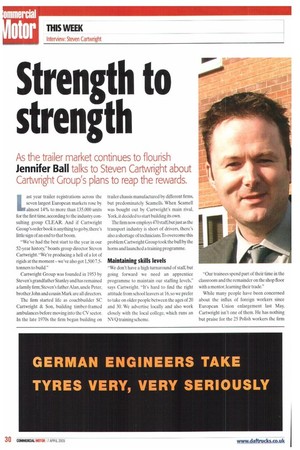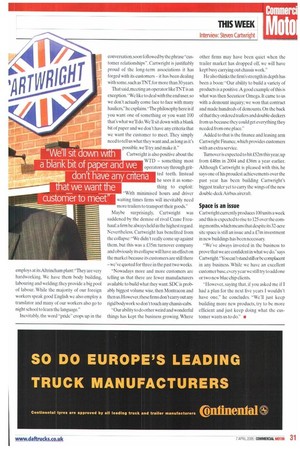Strength to strength
Page 30

Page 31

If you've noticed an error in this article please click here to report it so we can fix it.
As the trailer market continues to flourish Jennifer Ball talks to Steven Cartwright about Cartwright Group's plans to reap the rewards.
Last year trailer registrations across the seven largest European markets rose by almost 14% to more than 135,000 units for the first time, according to the industry consulting group CLEAR. And if Cartwright Group's order book is anything to go by,there's little sign of an end to that boom.
"We've had the best start to the year in our 52-year history," boasts group director Steven Cartwright. "We're producing a hell of a lot of rids at the moment — we've also got 1,500 7.5tonners to build."
Cartwright Group was founded in 1953 by Steven's grandfather Stanley and has remained a family firm; Steven's father Alan, uncle Peter, brother John and cousin Mark are all directors.
The firm started life as coachbuilder SC Cartwright & Son, building timber-framed ambulances before moving into the CV sector. In the late 1970s the firm began building on trailer chassis manufactured by different firms, but predominately Seamells. When Scamell was bought out by Cartwright's main rival, York, it decided to start building its own.
The firm now employs 470 staff, hut just as the transport industry is short of drivers, there's also a shortage of technicians.To overcome this problem Cartwright Group took the bull by the horns and launched a training programme.
Maintaining skills levels
"We don't have a high turnaround of staff, but going forward we need an apprentice programme to maintain our staffing levels," says Cartwright. "It's hard to find the right attitude from school leavers at 16, so we prefer to take on older people between the ages of 20 and 30. We advertise locally and also work closely with the local college, which runs an NVQ training scheme. "Our trainees spend part of their time in the classroom and the remainder on the shop floor with a mentor, learning their trade."
While many people have been concerned about the influx of foreign workers since European Union enlargement last May, Cartwright isn't one of them. He has nothing but praise for the 25 Polish workers the tirM employs at its Altrincham plant:"They are very hardworking. We have them body building, labouring and welding: they provide a big pool of labour. While the majority of our foreign workers speak good English we also employ a translator and many of our workers also go to night school to learn the language."
Inevitably, the word "pride" crops up in the conversation, soon followed by the phrase -customer relationships". Cartwright is justifiably proud of the long-term associations it has forged with its customers — it has been dealing with some, such as TNT, for more than 30 years.
That said,meeting an operator like TNT is an exception." We like to deal with the end user, so we don't actually come face to face with many hauliers," he explains."The philosophy here is if you want one of something or you want 100 that's what we'll do. We'll sit down with a blank bit of paper and we don't have any criteria that we want the customer to meet. They simply need to tell us what they want and.as long as it's possible, we'll try and make it."
Cartwright is also positive about the WTD — something most operators say through gritted teeth. Instead he sees it as something to exploit: "With minimised hours and driver waiting times firms will inevitably need more trailers to transport their goods."
Maybe surprisingly, Cartwright was saddened by the demise of rival Crane Freuhauf;a firm he always held in the highest regard. Nevertheless, Cartwright has benefited from the collapse: "We didn't really come up against them, but this was a £35m turnover company and obviously its collapse will have an effect on the market because its customers are still there — we've quoted for three in the past two weeks.
"Nowadays more and more customers are telling us that there are fewer manufacturers available to build what they want. SDC is probably biggest volume wise. then Montracon and then us. However,these firms don't carry out any rigid bodywork so don't touch any chassis-cabs.
"Our ability to do other weird and wonderful things has kept the business growing. Where
don't have any cntena
other firms may have been quiet when the trailer market has dropped off, we will have kept busy carrying out chassis work."
He also thinks the firm's strength in depth has been a boon: "Our ability to build a variety of products is a positive. A good example of this is what was then Securicor Omega. It came to us with a demount inquiry; we won that contract and made hundreds of demounts. On the back of that they ordered trailers and double-deckers from us because they could get everything they needed from one place."
Added to that is the finance and leasing arm Cartwright Finance, which provides customers with an extra service.
Turnover is expected to hit £52m this year, up from £48m in 2004 and £36m a year earlier. Although Cartwright is pleased with this, he says one of his proudest achievements over the past year has been building Cartwright's biggest trailer yet to carry the wings of the new double-deck Airbus aircraft.
Space is an issue Cartwright currently produces 100 units a week and this is expected to rise to 125 over the corning months,which means that despite its 32-acre site space is still an issue and a £7m investment in new buildings has been necessary.
"We've always invested in the business to prove that we are confident in what we do," says Cartwright."You can't stand still or be complacent in any business. While we have an excellent customer base, every year we still try to add one or two new blue chip clients.
"However, saying that, if you asked me if I had a plan for the next five years I wouldn't have one," he concludes. "We'll just keep building more new products, try to be more efficient and just keep doing what the customer wants us to do." •
















































































































































































































